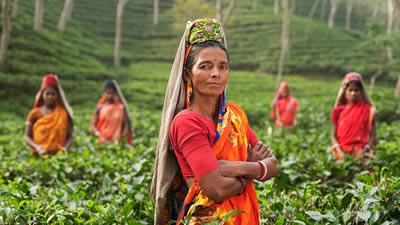Statistics often reveal unseen forces, but more needs to be done to incorporate gender equality insights into economy and trade statistics to get the full picture.
UNCTAD is on a drive to spotlight the importance of improved data and statistics for the design of more gender-responsive trade policies.
This is the subject of a groundbreaking new policy brief on the topic.
“International trade has been criticized for leaving people behind – and among the forgotten, many are women,” UNCTAD Deputy Secretary-General Isabelle Durant pointed out at the launch of the brief in a session on Better Data and Statistics for Gender-responsive Trade Policy at the World Trade Organization (WTO) Public Forum in October.
The theme of “leaving no-one behind” is a clarion call heeded by the international community and statisticians.
“Statisticians strive to leave no-one behind by compiling statistics that provide equal insights on the lives of women and men, children and elderly, and across various socio-economic, racial, religious and cultural groups,” UNCTAD’s head of statistics and information, Steve MacFeely, says.
“The availability of statistics disaggregated by gender has increased significantly over the years, but we do not know enough about gender equality in the economy and trade yet.”
Women’s economic empowerment is crucial for economic growth, but to support women, the information gap needs to be closed.
Highlighting the value of gender statistics and recent progress to incorporate gendered statistics was the goal of the 7th Global Forum on Gender Statistics in Tokyo in November 2018.
Several organizations and countries presented their latest work to measure women’s economic empowerment and entrepreneurship, including the Asian Development Bank, the International Labour Organization (ILO) and UN Women.
Women entrepreneurs are, for instance, more likely to rely on personal savings and spousal funds to start their businesses and less frequently use bank loans, a recent Future of Business Survey by the Organisation for Economic Co-operation and Development (OECD), Facebook and the World Bank showed.
Gendered data trends
Improving data and evidence for gender policies is an important factor and weeds out assumptions, the forum heard.
The Asian Development Bank recently concluded three country reports based on pilot surveys on entrepreneurship and asset ownership from a gender perspective in Georgia, Mongolia and the Philippines.
“There are significant differences across countries in women’s economic empowerment. We cannot simply assume something, and design policies based on assumptions,” said UN Women’s Papa Seck, commenting on the results of pilot surveys
The case of Georgia is telling. The survey found that there, men are 1.8 times more likely than women to own a non-agricultural enterprise, and 1.3 times more likely to do so in Mongolia.
In contrast, in Cavite, the Philippines, women are 1.3 times more likely than men to own an enterprise. Men were in general more likely to own assets and have the exclusive right to sell them in these three countries.
These insights can influence policy interventions and decision-making.
Seeing in high definition
On the labour front, data is also illuminating. “Labour statistics have a huge gender-relevance,” said the ILO’s senior statistician, Kieran Walsh, adding that it helped society see challenges in higher resolution.
“Even the simplest statistics on time use in paid and unpaid activities may be powerful in providing a fuller understanding of differences between men’s and women’s employment, work and contribution to household wellbeing.”
Other countries rely on the big picture, or globally agreed statistical standards, to make decisions.
Ala Negruta from Moldova’s National Statistical Office said they count on international statistical standards as an authoritative backstopping on what needs to be measured and how, especially in sensitive gender-related issues.
The forum also heard from civil society organizations who shared innovations in using geospatial data and non-traditional data sources to gather better evidence to ensure no-one is left behind.
Figuring out gender and trade
UNCTAD is now collaborating with the ILO, UN Women and other international organizations and governments to develop a comprehensive statistical framework and survey tools for the measurement of the gender dimensions of trade.
“It is high time to invest in data to help governments develop gender-responsive trade policies,” adds Mr. MacFeely, referring to the newly launched UNCTAD work stream on gender and trade statistics.
The forum was organized by United Nations Statistics Division (UNSD) in collaboration with the Japanese Ministry of Internal Affairs and Communications.

